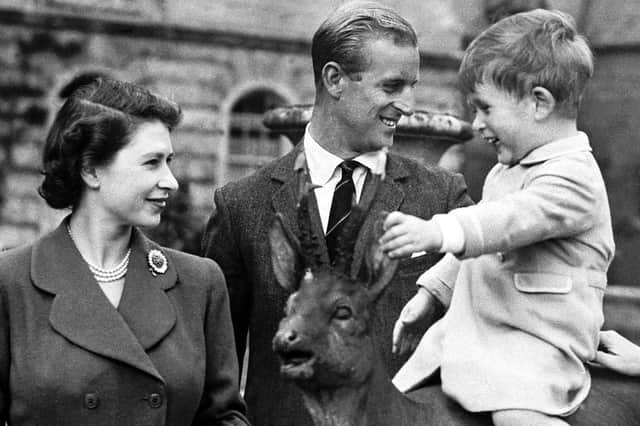Our Queen was a great teacher to Charles, now he must show he was an able pupil - Brian Monteith


With over 86 per cent of British people aged under 70 it is undeniable a significant majority of us – some 60 million to 9 million have never known anything other than Queen Elizabeth being our Monarch and head of state. This fact alone – the constancy of one person – and such a gracious, modest and inspiring figure as she was to so many – always being there, and being above the differences that may have brought about our historical events has undoubtedly contributed to an appreciation of not having a political and divisive figure at our helm.
Such an enduring and endearing constant presence through the sadness and joys of our shared communal experiences – dispensing sympathy, encouragement and thanks on our behalf – be they attending after human tragedies such as the Aberfan disaster, honouring sporting achievements such as Olympic medals and world titles, or paying respects and remembering military valour in the great wars or more recently during her reign, such as the Falklands.
Advertisement
Hide AdAdvertisement
Hide AdThis role could only be done convincingly by having empathy for the kaleidoscope of regional, religious and cultural differences – as rich and divergent within Scotland as within the whole United Kingdom – while being colour-blind and indifferent to personal wealth of her people. This required patience, a good ear, humility and touch of humour, all of which her Majesty had in spades.
It is no overstatement to say the Queen reinvented our Monarchy and modernised it beyond the ken of most of us, prompted and helped by her late husband the Duke of Edinburgh.
The Queen’s constancy was so important to our sense of self, personal and national, conscious and subconscious, that it has become common to marvel that she reigned over 15 British prime ministers from Churchill to Truss – but it is not generally appreciated she also spanned 14 US Presidents, meeting all of them except Lyndon Johnson, and 11 French Presidents. This sense of an international age, if not a reign, won friends and disarmed many a possible political critics, bringing to reality the Queen’s quip “one has to be seen to be believed.”
So significant was her presence in the world that she was respected, and in some places revered, causing the tributes to pour in from around the world. It may come as a surprise to some readers that tributes from France have been especially effusive, but having lived in France previously for 11 years, it was not to me.
Projections of the Union Flag appeared on the Burj Khalifa in Dubai, the Brandenburg Gate in Berlin; on the East Face of the Matterhorn, Switzerland, and in Tel Aviv, Israel.
Poignantly, in Paris the Eiffel Tower fell dark, while the Sydney Opera House and New York ‘s Empire State carried the Queen’s portrait. The statue of Christ the Redeemer in Rio de Janeiro and buildings in Madrid and Cape Town were red, white and blue – while other cities such as Ottawa and Montreal chose regal purple for their symbolic edifices. Flags of many, many nations were lowered and President Biden ordered the Stars and Stripes be flown at half-mast on all federal and military buildings at home and abroad.
The difference between a head of state that changes regularly, sometimes as often as we change prime ministers, is not, I believe fully understood or appreciated. The role of our monarch is undoubtedly to bind the nation together, to be a physical and moral force and key to this requirement is not to be politically partisan or religiously sectarian. Elizabeth was studious in seeking to be everyone’s Queen and was therefore respected for her duty, her modesty, and laterally her sense of humour that showed her sense of fun.
It is also forgotten that the Queen was the constitutional monarch to Canada, Australia, New Zealand, Papa New Guinea, Jamaica and more – altogether 15 countries forming the Commonwealth Realm. When our Queen died their Queen died too.
Advertisement
Hide AdAdvertisement
Hide AdIt is often said that Scotland should seek to be like other small countries, especially Scandinavian lands such as Norway, Denmark and Sweden – yet it is rarely acknowledged that many of them have constitutional monarchies. Indeed many of the most successful countries in the world, be their success measured in economic prosperity or the more vague measure of happiness also have constitutional monarchies – such as the Netherlands, Belgium, Spain and Luxembourg or Thailand and Japan.
The next week will be an interregnum of sorts, there will still be reminisces carried by our media – most informatively from everyday people who have their own anecdotes and insights to meeting Queen Elizabeth – as Charles III already opens the Red Boxes and begins to consider the changes he believes necessary for the modernisation of our constitutional monarchy.
Charles III will be his own King – a phrase many of us will take a little getting use to – just like my grandparents struggled to call Holyrood Park anything other than the Kings Park, whereas I always knew it as the Queen’s Park. He does however come with one significant disadvantage that he cannot provide the personal constancy that comes from a 70-year reign. What he can do is follow from his mother’s teaching by being a "peoples’ King" to provide a constancy in tone if not style. He has the advantage of having had the best dominie possible, and of having gained experience from being a patient understudy. For all our best outcomes, whatever our differences, we must wish him well.
Brian Monteith is a former member of the Scottish and European Parliaments and is editor of ThinkScotland.org
Comments
Want to join the conversation? Please or to comment on this article.
